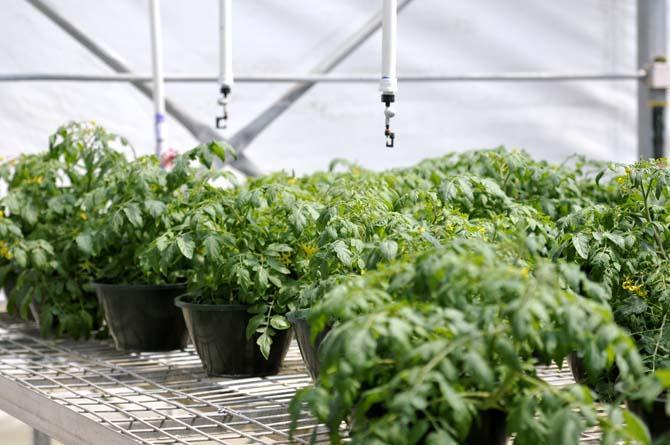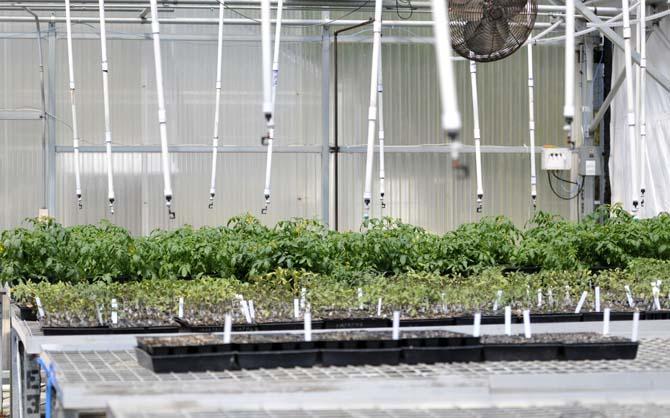The field of horticulture is still growing — literally — and its latest manifestation at the University is a class where the students’ lab is a farm.
Bob Mirabello, horticulture instructor, said students in his HORT 2070 lab class learn about plant propagation and gain practical experience using various methods. The class meets every Tuesday afternoon at the Hill Farm near the University Student Recreational Complex, where students are able to watch the entire seed-to-plant growth process, Mirabello said.
The students grow a variety of plants to use in lab experiments that include grafting one type of plant onto another or testing different rooting hormones, Mirabello said. Just about anything from tomatoes to roses to olive trees is grown at the farm, and students are welcome to take any leftovers home.
Mirabello said the course focuses on commercial plant propagation methods that are used for large-scale production. The practical horticulture training the course provides is vital, he said.
“Everything we do in horticulture … is based upon how you grow the plants, how you start the plants off,” Mirabello said. “If [students] go into nursery production, even if they become landscape contractors, they see how the plants are produced.”
Although some lab days require a lot of tedious cutting and transplanting, horticulture junior Becky Lewis said the class is interesting and enjoyable because of its hands-on nature.
“Every class is like a field trip,” Lewis said. “We get to go outside — we don’t have to sit through a boring lecture.”
Mike Adams, who is retired and working on a third undergraduate degree, joked that he is “taking a hobby too far,” but said a horticulture degree and the 2070 class in particular illuminate a broader spectrum of backyard gardening, which many people do for fun.
“You can’t read about it and get it right the first time, but having someone with experience show you exactly what you’re doing right and wrong, you pick it up a lot more quickly,” Adams said.
Mirabello said the class is a “grand experiment” because this is the first semester it has been taught. It is a combination of the lab components of the general horticulture and plant propagation courses, which are in the process of being approved by the University as a general education science sequence, he said.
Those two classes, as well as the 2070 class, are open to non-horticulture majors, but Mirabello said the general education sequence would give students from other majors an incentive to take courses that may already interest them.
Mirabello said horticulture appeals to a large audience and intersects with many other fields of study. Education majors, for example, could use horticulture curriculum to teach elementary school students about biology, he said.
Horticulture touches every person on the planet, meaning the field is still evolving, Mirabello said.
Mirabello said people have recently become more in touch with their food and where it comes from, creating a growing interest in small-scale sustainable agriculture. This trend benefits local economies in Louisiana because the state’s commercial horticulture industry declined when states such as California grew their production, he said.
“That niche has been created, and we see a lot of our students coming in [are] now interested in doing small-scale horticulture production — vegetables, fruit crops, looking at local markets, farmers markets,” Mirabello said.
Horticulture also includes landscaping, which Mirabello said is important because people value visual impressions. While people could live without manicured flower beds and lawns, efforts such as campus beautification are significant, he said.
“People have not lost their interest in pretty things and the food they eat, so the opportunities for our students is continually evolving, and there’s always going to be a place for it,” Mirabello said.
“Every class is like a field trip. We get to go outside — we don’t have to sit through a boring lecture.”






